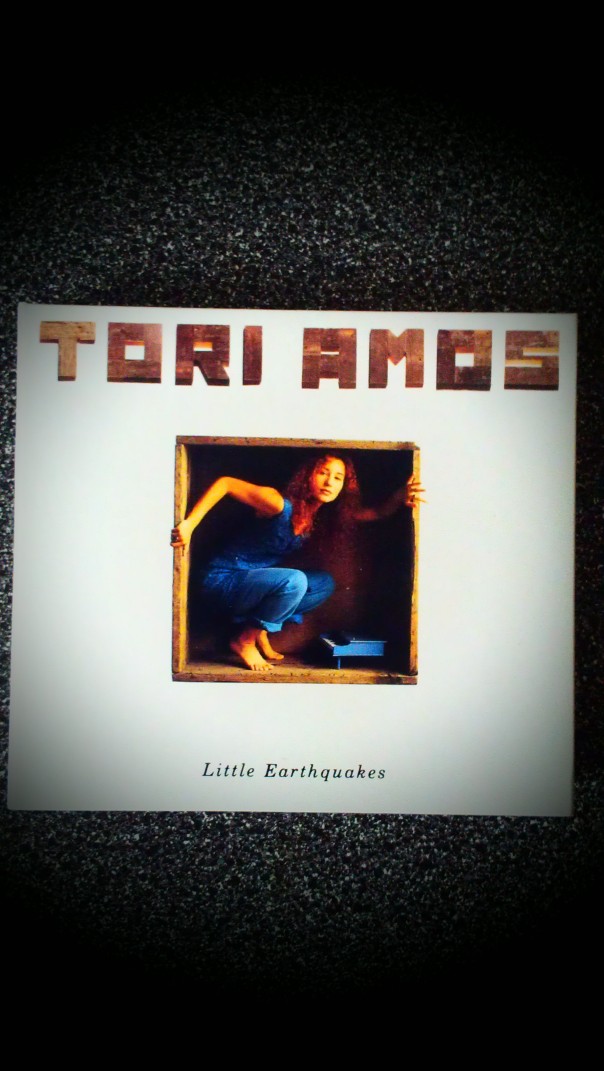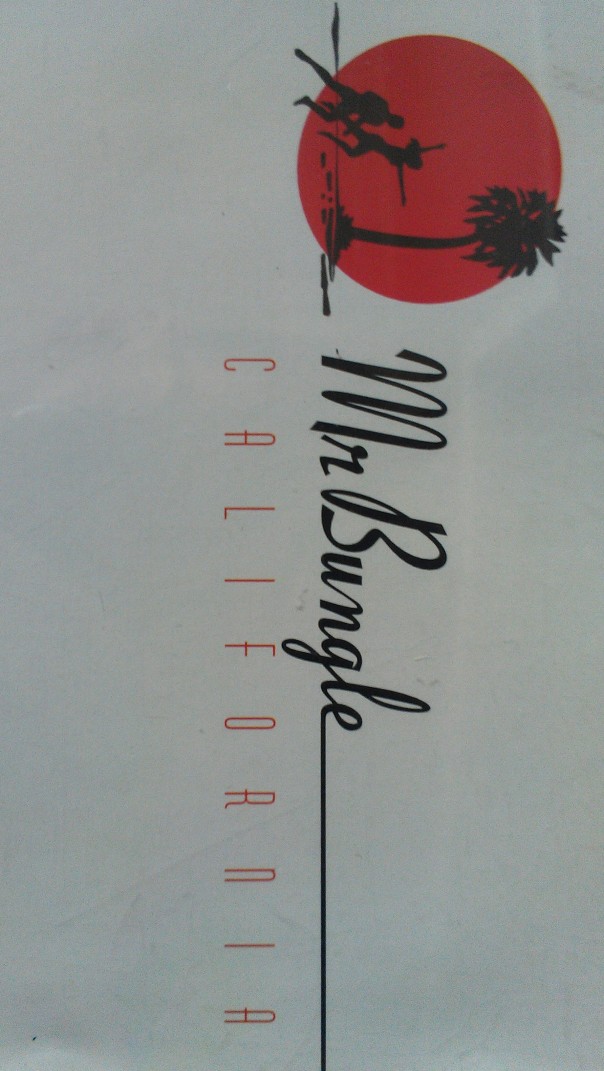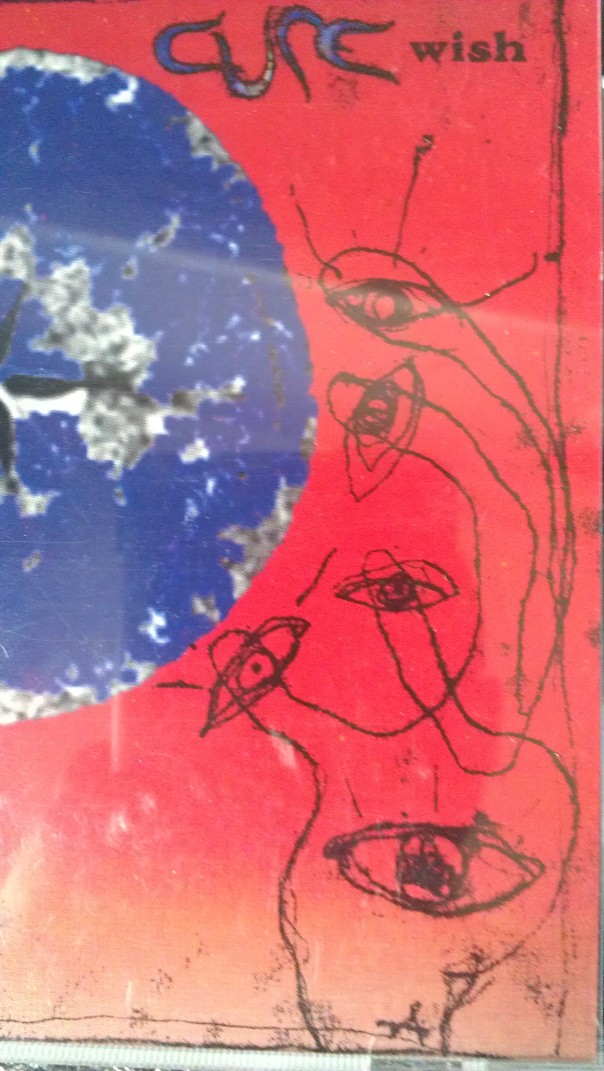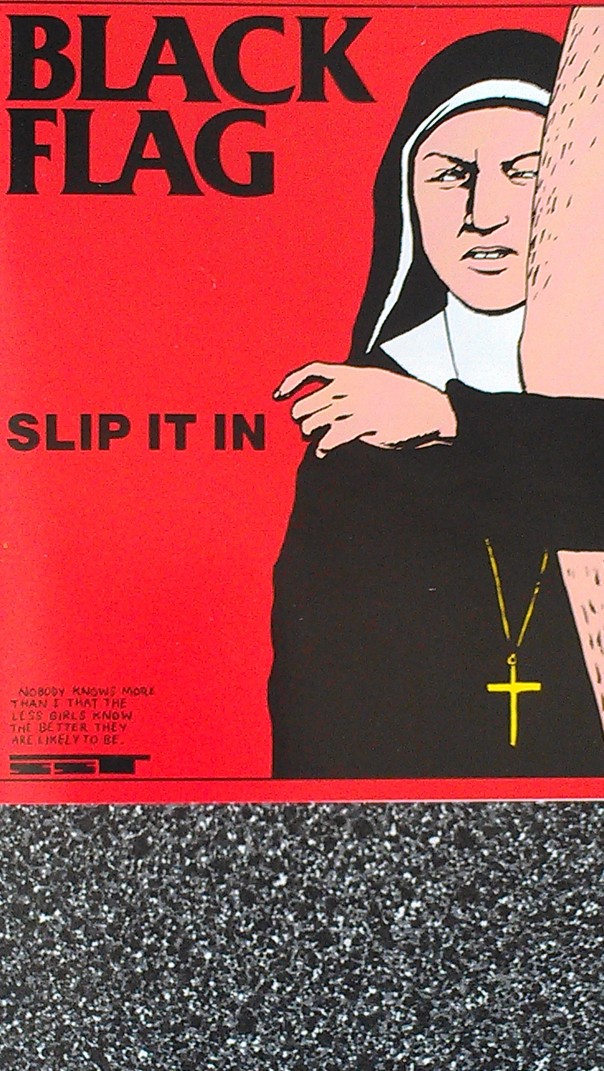In the late eighties there were only two types of female artists; pop singers and R&B singers. Then along came Tori Amos. Record companies tried to make her fit into one of these categories, but she just didn’t fit. She was different, she was an alternative artist with pre-grunge angst, pre-industrial lyrics wrapped up and disguised in piano melodies. This past week, her first album Little Earthquakes got a deluxe edition make over twenty four years after it’s 1991 release. So if the title of the article didn’t give it away, I have been enjoying the re-visitation of this groundbreaking set of songs. Opening with an incredibly strong track, “Crucify,” a dark piano driven song about suffering for the love of someone else. As is with most of her lyrics, there are many different ways the words can be interpreted. With verses like “drive another nail in like God needs one more victim” and “where are those angels when you need them,” the listener learns real quick that this beauty isn’t singing happy love songs for the masses. The piano acts as a tour guide guiding you through this cathartic release of self inflicted suffering that both sexes can relate to. Musically, the next song “Girl,” isn’t as intense with it’s lounge-esque feel but lyrically it is just as strong. Dark images of a girl that has been taken advantage with uncomfortable phrases “I’ve cuts on my knees falling down as the winter takes one more cherry tree.” The music also builds to this coming together of piano, guitar, violins, and drums where the vocals get layered. Musicians, much less females artists, didn’t write music this deep during the late eighties. “Silent All These Years” has an eerie sort of winter holiday piano sound backed up by an orchestra that could lyrically be Amos singing her biography. Beautiful and empowering. One of my favorites numbers, “Precious Things,” really opens things up. Fast tempo piano coupled with heavy breathing for an intro, this is dark lyrics accompanied by dark music. Strong electric guitars punctuate some of the strongest lyrics. “He said you’re really an ugly girl, but I like the way you play,” that is fucked up even by today’s standards. Then acoustic piano and electric piano start to weave together over howls and intense words until you are spent. Things come back down a bit in the same vein as “Silent All These Years” with “Winter”. The orchestra really takes the spotlight on this number. The music and metaphors capture the imagination of snow white scenes and the cold that accompanies it. The “Happy Phantom” introduces a thirties burlesque sound of piano fun. It has some of the strangest lyrics, but a very Beatle-esque experimental vibe that makes it standout from the other songs because of it’s uniqueness. This song needs multiple listening’s just to hear all the stuff going on. Next is the one song on the entire album that most closely resembles a “normal” ballad, “China.” Longing strings and beautiful piano follow Amos’s voice as she compares the distance between two lovers matching that of various places like New York and China. Maybe released a few years later, it would have been a much bigger single than what it was back then. If you have heard the Dresden Dolls or Amanda Palmer, “Leather” would be the seed that nearly all their songs could be traced back to. Flapper girls in a dank bar atmosphere is created by the piano as her voice has a sarcastic happy as can be tone to it. Short and straight to the point, another example of something really dark going on under the words sang. All piano and vocals, “Mother” starts off slow, then builds to faster tempo. Lyrically, this song feels all about going off to became a woman and losing yourself along the way. The changes in tempo match perfectly with the story being told. As a male listener, you almost feel like a voyeur on some sacred female right of passage gone wrong. Another favorite of mine, “Tear In Your Hand” as all the elements that would very soon be associated with many alternative songs. The story of a break up with an “I Will Survive” attitude and a stronger presence of guitars and drums. It also has one of my all time favorite Tori lyrics “I don’t believe you’re leaving cause me and Charles Manson like the same ice cream.” Both sad and funny, it really does sound like some kind of bizarre guy logic. Toward the end, just where one might expect a guitar solo, a piano solo steals the show, then right back to the song. Nothing on this album or any other album prior to it could prepare the listener for the next song, “Me And A Gun.” No music, just words. Haunting words. A song about rape? Maybe, regardless it is one of the most open and vulnerable songs I have ever heard. Kurt Cobain may have sung with angst and conviction, but this is something on an entirely different level. The less is more approach works in unforgettable ways. After catching ones’ breath next comes the closer, another one of my favorites, “Little Earthquakes.” A push-pull tempo with a toned down guitar pulls you back up from the last song, but not all the way up. Building and building, the slow burn picks back up midway through only to pull you back down with overlapping vocals and harmonies. Crying out “give me life, give me pain, give me myself again” fills this song with desperation that is palpable. Then the music falls back down to piano and harmony as the music fades. This is the perfect song to end on, establishing Tori Amos as a major player in the soon to be exploding scene of a0tlernative music. The deluxe edition is also accompanied by a great collection of b-sides highlighted by “The Pool,” “Sugar,” and a one of a kind cover of “Smells Like Teen Spirit.” The re-mastered songs sound vibrant, even if you already have Little Earthquakes, it is worth the price to get them. A beautiful release by a beautiful artist that paved the way for many female musician today, you owe it to yourself to check out “these little earthquakes!”

Monthly Archives: April 2015
Mr. Bungle -California
With just a few weeks until Faith No More’s first new release in eighteen years, I have been listening to all things Mike Patton of late. That musical binge has brought me back to Patton’s first band, Mr. Bungle. Falling somewhere in the middle of their first self-titled release and their second Disco Volante, California brings all things avant garde while still being accessible to the masses. It has been said that not all Patton projects are for everyone and sometimes not even all the releases from the same collaborators, but California does an excellent job balancing the two. For those not familiar with Mr. Bungle, picture all musical genres fused with many lyrical stylings that sometimes border on obsessive and you have Mr. Bungle. Occassionally that represents not only an album, but sometimes a single song. California opens with “Sweet Charity,” an almost contemporary jazzy lounge number. Whistling and harmonies coupled with Patton’s singing drive this mellow number. There is even some fun guitar playing in the middle that almost sound luau themed. From the birds intro to the fading out of the music, this song takes you to a peaceful beach of relaxation. At least before the musical schizophrenia kicks in! “None Of Them Knew They Were Robots” is six minutes of musical diversity. Starting off fast, it quickly gives way to horns accentuating Patton’s voice. Each tempo change highlights a different instrument, the use of Patton’s voice is included in those instruments being utilized. Think the Beach Boys messed up on coke playing at high speeds. Sprinkle in some additional sound effects and the occasional lyric not in English, and you have a very unique musical experience. This is a song that begs to be heard multiple times just to attempt to hear every sound. One of the best songs found on the album, “Retrovertigo” opens with a nice acoustic guitar piece joined by keyboards. The music feels like it is slowly building toward something while Patton appears to be lyrically attacking society’s fixation on television. Then the keyboards tease you just a little more until everything is brought a musical climax for the final minute or so. Even the repeated verse starts to have more intensity and conviction to it. Then it is time for some alien abduction in “The Air-Conditioned Nightmare.” A very serious sounding opening quickly turns into a be-bopping retro cartoon number. The music reflects the insanity that being trapped, or abducted, might bring. It even follows the stages of grief. Once the heavy sounds of frustration have come to grips with the situation, acceptance sets in. When it sets in, the rhythm slows and the music almost turns sunny, but not before one more outburst. Then it returns to it’s peaceful acceptance asking “where’s my rainbow.” Next on the musical rollercoaster is “Ars Moriendi.” Castanets and accordions take you through a very fast paced number that even make the lyrics sung in English sound foreign. At times, the music builds to fast paced violin playing that sounds akin to a European nightmare. I even imagine this as the soundtrack to tripping out on ‘shrooms while traversing southern Europe. Then you come down quickly to hear a lovely du-wop song about betrayal and/or loss in “Pink Cigarette,” another favorite. While the music makes you want to snap your fingers and hum along, lyrically Patton is singing about killing himself. The piano pushes it’s way to the forefront of the sound-scape until death overtakes the character of the song. It abruptly ends wit the sound of flat lining. But fear not, the album doesn’t die there, in fact it goes another direction on “Golem II: The Bionic Vapor Boy.” Starting off with wind-up toy sound effects, this song has the sound of a group of guys who grew up in the Nintendo generation. Very eighties gaming sounding with it’s various sound effects. It is also has the first significant use of voice modification, unlike Disco Volante which seemed to be used on every song. And where is “Golem I,” you ask? Beats the shit out of me! “The Holy Filament” is the closest thing to an instrumental found on the release, even though there are some lyrics. Driven by a beautiful piano piece, the words seem to stretch across the music specifically to accentuate the sounds. It does have a musical score vibe to it, but in a Mr. Bungle sort of way of course. My favorite song on California, “Vanity Fair,” once again has that Jekyll and Hyde feel to it. The music takes the listener one way while the lyrics go another. Another fifties du-wop sound led by horns, this song and it’s harmonies beg the listener to snap along. More upbeat in tempo and rhythm than “Pink Cigarette,” the lyrics tell a tale about someone so lovely that it makes them want to “de-sex” themselves. In other words, it’s a song about becoming a eunuch! Only Mike Patton can sing that in a way that convinces you that it would the right thing to do. Rounding out the album is the song that more closely resembles their first release, “Goodbye Sober Day.” Very fast paced, it changes tempos almost every verse. At one point near the end of the song, it even turns into what could be construed as monks chanting. Then it picks right back up with nearly every instrument being played at their most intense of the entire album, especially the guitars. Then the cascade of noise finally comes to end, just like the band did sometime after the release of California. If you are looking for something a little left of center musically, or you are just needing to get a Mike Patton fix until the new Faith No More, this is the Mr. Bungle album you should start with.

The Cure -Wish
When most people think about listening to a Cure album, most usually gravitate toward the gloom and doom trilogy of Pornography, Disintegration, or Bloodflowers. While all three are tremendous albums and I would be hard pressed to choose a favorite, I find myself listening to their ’92 release Wish more than any other lately. Released a couple of years after Disintegration, Wish is just as dark but Robert Smith disguised all of it in catchy pop-esque melodies. I’m even of the opinion that lyrically it may be the darkest Cure album of them all. Opening appropriately enough with “Open,” an intense downward spiral lyrically about self loathing, the Cure hadn’t sounded this heavy since their early days. Easily one of my favorite tracks, it sets a mood far different from most of their releases. Just because Robert Smith is the king of sorrow doesn’t mean he can’t write one hell of a catchy pop song. Exhibit A is “High.” Very catchy hooks with some do-do-do’s thrown in, suddenly he is singing about someone else’s happiness and how that makes him feel. Wild Mood Swings was the release that followed Wish, but the name easily could have been representative of this album given the vast difference from song to song. “Apart” is sad, dreary, and depressing telling the story of a relationship at it’s end. The words are cold, but very relatable to anyone who has had a failed relationship in their life. The high school me could relate all to well! Similar in structure and pace, “From The Edge Of The Deep Green Sea,” has some of the same vibes found in “Open.” Self loathing has been replaced by addiction, but not the way you might think. The drug of choice for this song is a girl, giving into the addiction of her even knowing that a relapse is the wrong answer. The music is incredibly hypnotic with pulsating drums and a guitars that washes over you while Smith is professing “I wish I could just stop, I know another moment will break my heart.” Next comes “Wendy Time” with more do-da-do-ing, making this song about a prostitute sound absolutely pop. Very sing-along choruses break up the tale of the woman propositioning the distant and depressed stranger, “it doesn’t touch me at all.” Another solid radio friendly sounding song with a darker message in the words. If the Cure had an anthem song, “Doing The Unstuck” would be it. A mellow opening gives way to an upbeat rhythm about letting go of the blues and starting new. Claiming it is never too late, Smith sounds at his highest point of optimism ever! The music intensifies as his conviction grows, building to a great end. “Friday I’m In Love,” the biggest single from Wish, exhibits again just how good the poppy side of Smith can be. Infectious in it’s sound and lyrics, it has some of the same fun found in “Just Like Heaven” and “Let’s Go To Bed.” Piano driven with melancholy to spare, “Trust” returns to the great depression of a failing romance. With very few lyrics, it is very similar to “Untitled” with it’s winding rhythms and dreary sounds. Another single, “A Letter To Elise,” goes back to the longing and regret, think “High” without the catchy background singing. Possibly my least favorite on the whole album. It’s not a bad song, but very easily forgettable and not nearly as good as several of the b-sides from this recording session. Or it could be the anticipation for the next song, my favorite “Cut.” With it’s distorted drawn out intro, to the aggressive drumming and in your face guitars, “Cut” has an attitude and edge that few Cure songs have. With hatred replacing the feelings for a person that just stopped loving you, everything about this song keeps pushing you to the brink until “it’s all gone.” Continuing the mood changes, “To Wish Impossible Things” tones it back down to the melancholy with such longing that the viola almost produces tears of sorrow with every listen. Coming to grips with the reality of the situation, Smith makes the song both beautiful and tragic. Closing out this rollercoaster of emotion is a defiant song, “End.” More heavy drumming surrounded by deliberate guitars, “End” is about giving up and giving in. In it’s entirety, Wish feels like a concept album running from “Open” to “End” about all phases of a relationship gone bad. It will never be confused for one of great “trilogy” albums, but it just might be the best Cure album that you haven’t heard.

Black Flag -Slip It In
My musical guilty pleasure this week takes me back to the late eighties where a small town mid-western misfit was always in search of new music. There was no Google or Amazon to search through, so your options were very limited. If it wasn’t mainstream getting radio play, you usually found new music from a friend of a friend who probably had an older sibling. Then you had to hope the nearest record store, yes record store, even carried the band. That was my experience finding Black Flag. While all punk has it’s roots in Iggy and the Stooges, these SoCal punk gods paved their own way starting the American west punk sound and style. By the time I discovered them, front man Henry Rollins was off starting the Rollins Band and Black Flag was basically over. Most people swear by their first official release, Damaged, but for me it was all about 1984’s Slip It In. Take nothing away from Damaged, it is a great hard hitting album that deserves all the respect it commands. Maybe I’m more of a Rollins guy, since he did have more song writing influence on this one. Or maybe I like the slightly longer, for them at least, songs that highlight their different talents. Always one to fall for sexual innuendos, the opening “Slip It In” doesn’t do a very good job hiding it’s intentions. Raunchy guitars with heavy drums, the tempo pausing during the chorus really convey the anticipation of slipping it in. Follow that up with Rollins guttural screams mixed in with Suzanne Gardner’s words and moans, and you have the making of a great opener for any album. Whether I”m working out or running, “Black Coffee” is one of my motivating go to songs still to this day. Aggressive words, guitars fighting Rollins for the leading sound, if this song doesn’t work you up, better check yourself for a pulse. For some reason I imagine half the bar fights during the mid-eighties had this song playing in the background. “Wound Up” follows with more of the same intensity, but this time with a more poppy guitar rift. It’s also another great example of how the drumming complements Rollins unique vocal styling’s. If you listen close enough, you might even hear the sound that Green Day has ripped off a thousand times over from Black Flag. Darker vocals and a sound so repetitious that it almost drives the listener crazy, “Rat’s Eyes” brings out the foundation of sludge metal. This is one of the few songs that I can only listen to on occasion. The instrumental “Obliteration” fuses heavy chord progression sprinkled with jazz to highlight guitarist Greg Ginn’s both eclectic and eccentric style. It’s a nice breather before Rollins gets ready to hit the last few tracks hard and heavy. “The Bars” with it’s bass slapping opening, has Rollins singing about being trapped both metaphorical and literal. Again, Bill Stevenson’s drumming sets the tone that frames Rollin’s words. Throw in another crunching Ginn solo near the end, and you have classic Black Flag. The shortest track on Slip It In, and one that could easily be confused for an older track, “My Ghetto” gives way to the intense thrash metal sound found all over Damaged. This time, however, Rollins fast time lyrics work better and sound more in sync than their earlier albums when Rollins was still finding his way in the band. Closing out this near 40 minute punch in the face is “You’re Not Evil.” Jazz-esque guitars fused with a catchy progression, Rollins sings about thinking you are tougher than what you really are. The bridges between verses once again show Ginn’s diverse playing ability before Rollins comes back in to set the listener straight. Clocking in at seven minutes, everyone gets piece of the action on the album’s closer. Black Flag will always be considered pioneers to all things punk, spoken word, thrash, and sludge. So go ahead, take out a Black Flag album and slip it in. I’m betting you will be happy that you did!
